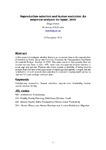Mostrar o rexistro simple do ítem
Reproductive selection and human evolution: An empirical analysis for Spain, 2010
| dc.contributor.author | Varela, Diego | |
| dc.date.accessioned | 2011-12-23T09:14:02Z | |
| dc.date.available | 2011-12-23T09:14:02Z | |
| dc.date.issued | 2011-12-23 | |
| dc.identifier.uri | http://hdl.handle.net/2183/8691 | |
| dc.description.abstract | [Abstract] In this paper I investigate whether there is an economic bias in the reproduction of humans in Spain using data from the Encuesta de Presupuestos Familiares (Household Budget Survey) of 2010. The main result is that parents that are income earners tend to earn 16% more than non-parents income earners of equal age and gender. Parents also have greater probability of being income earners than the rest of the population of equal age and gender. I argue that the contribution of such reproductive selection to economic development can be as high as half a percentage point per year. | es_ES |
| dc.language.iso | eng | es_ES |
| dc.subject | Evolutionary economics | es_ES |
| dc.subject | Sexual selection | es_ES |
| dc.subject | Reproduction | es_ES |
| dc.subject | Human capital | es_ES |
| dc.subject | Income | es_ES |
| dc.subject | Fertility | es_ES |
| dc.subject | Spain | es_ES |
| dc.title | Reproductive selection and human evolution: An empirical analysis for Spain, 2010 | es_ES |
| dc.type | info:eu-repo/semantics/workingPaper | es_ES |
| dc.rights.access | info:eu-repo/semantics/openAccess | es_ES |






